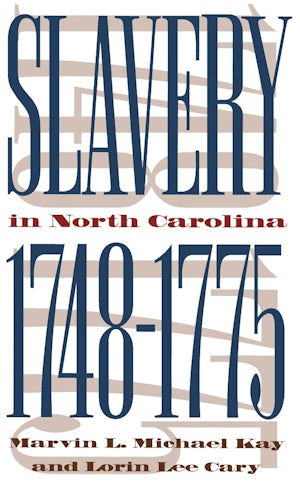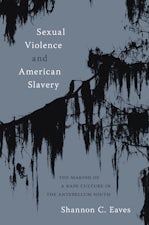Slavery in North Carolina, 1748-1775
By Marvin L. Michael Kay, Lorin Lee Cary
420 pp., 6.125 x 9.25, 5 illus., 49 tables, 5 maps
-
Paperback ISBN: 978-0-8078-4819-7
Published: February 1999 -
E-book EPUB ISBN: 978-0-8078-6238-4
Published: November 2000 -
E-book PDF ISBN: 979-8-8908-7104-6
Published: November 2000
Buy this Book
- Paperback $55.00
- E-Book $29.99
For Professors:
Free E-Exam Copies
Awards & distinctions
1995 Ohio Academy of History Book Prize
Kay and Cary clearly demonstrate that slaveowners erected a Draconian code of criminal justice for slaves. This system played a central role in the masters' attempt to achieve legal, political, and physical hegemony over their slaves, but it impeded a coherent attempt at acculturation. In fact, say Kay and Cary, slaveowners often withheld white culture from slaves rather than work to convert them to it. As a result, slaves retained significant elements of their African heritage and therefore enjoyed a degree of cultural autonomy that freed them from reliance on a worldview and value system determined by whites.
About the Authors
Marvin L. Michael Kay is a professor emeritus of history at the University of Toledo.
For more information about Marvin L. Michael Kay, visit
the
Author
Page.
Lorin Lee Cary is a professor emeritus of history at the University of Toledo.
For more information about Lorin Lee Cary, visit
the
Author
Page.
Reviews
"[Makes] a very important contribution to the study of early American slavery by showing . . . what it is possible to learn from relatively little in the way of conventional sources."--Journal of Southern History
"A marvelously thorough work. . . . It will stand for many years as a monument to its field."--Mississippi Quarterly
"Kay and Cary have made an important contribution to our understanding of American slavery. They remind us that both the South's peculiar institution and its system of race relations were more dynamic than is often assumed."--Southern Cultures
"Readers interested in colonial slavery need to become familiar with this book. Its main value is in forcing us to rethink what we believe about acculturation and the nature of slave society in early America."--Journal of American History
"Interesting, insightful, and necessary for a full understanding of slavery in colonial North Carolina as well as more broadly in the British-American empire."--North Carolina Historical Review
"Michael Kay and Lorin Cary make it possible for us to understand how much of pre-Revolutionary North Carolina functioned, and how an enduring segment of its population (African in origin) made its way in a new world. The scope of research, the reach of learning, and the wisdom of interpretation in this book are enormous."--William S. Price Jr., North Carolina Division of Archives and History




